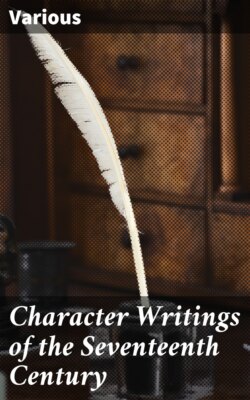Читать книгу Character Writings of the Seventeenth Century - Various - Страница 76
На сайте Литреса книга снята с продажи.
AN ORDINARY WIDOW
ОглавлениеTable of Contents
Is like the herald's hearse-cloth; she serves to many funerals, with a very little altering the colour. The end of her husband begins in tears, and the end of her tears begins in a husband. She uses to cunning women to know how many husbands she shall have, and never marries without the consent of six midwives. Her chiefest pride is in the multitude of her suitors, and by them she gains; for one serves to draw on another, and with one at last she shoots out another, as boys do pellets in eldern guns. She commends to them a single life, as horse-coursers do their jades, to put them away. Her fancy is to one of the biggest of the Guard, but knighthood makes her draw in in a weaker bow. Her servants or kinsfolk are the trumpeters that summon any to his combat. By them she gains much credit, but loseth it again in the old proverb, Fama est mendax. If she live to be thrice married, she seldom fails to cozen her second husband's creditors. A churchman she dare not venture upon, for she hath heard widows complain of dilapidations; nor a soldier, though he have candle-rents in the city, for his estate may be subject to fire; very seldom a lawyer, without he shows his exceeding great practice, and can make her case the better; but a knight with the old rent may do much, for a great coming in is all in all with a widow, ever provided that most part of her plate and jewels (before the wedding) be concealed with her scrivener. Thus, like a too-ripe apple, she falls off herself; but he that hath her is lord but of a filthy purchase, for the title is cracked. Lastly, while she is a widow, observe her, she is no morning woman; the evening, a good fire and sack may make her listen to a husband, and if ever she be made sure, 'tis upon a full stomach to bedward.
